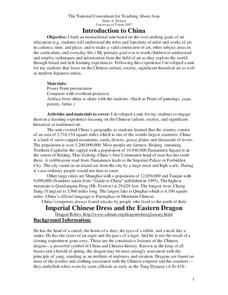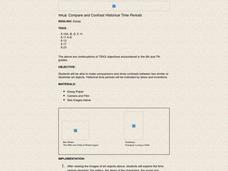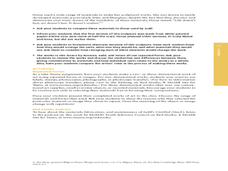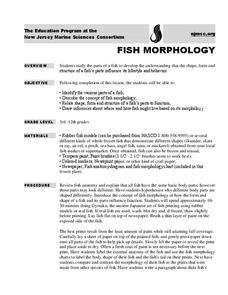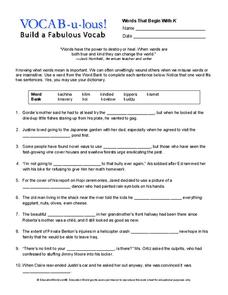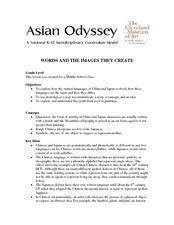Curated OER
Introduction to China
Compare and contrast the distinctive characteristics of art forms from various cultural, historical, and social contexts, and describe how the same subject matter is represented differently in works of art across cultures and time...
Curated OER
Food and Languages of the World
Students examine Japanese culture. In this multicultural lesson, students taste rice crackers and create Japanese fans from paper and paint.
Curated OER
Photomosaic Pixel Composite
Students select an animal to research. After completing the research they illustrate and paint their animal in the style of a Japanese scroll. Their illustrations are scanned into the computer and imported to PowerPoint. Students...
Curated OER
Monet's Garden
Fourth graders review impressionism and one of the well-known artist of this period, Claude Money. They explore "en plein air," an outdoor painting technique that Monet employed to create his work. They also experiment with warm and...
Curated OER
Passionate Pilgrims- Two Poets And A Painter
Students engage in a lesson that looks at the culture of Japan to isolate the practices of painting and writing in several different traditions. They conduct research about the lives of the artists using a variety of resources. The...
Curated OER
COMPARE AND CONTRAST HISTORICAL TIME PERIODS
Students make comparisons and show contrasts between two similar or dissimilar art objects. Historical time periods will be indicated by dress and inventions.
Curated OER
Word Play
Students examine the Japanese folktale, Monkeys Grasp for the Moon. In this multicultural literature lesson, students discuss the theme of the folktale. Students choose animal folktales from other Asian cultures for comparison.
Curated OER
Historical Witness: Social Messaging
Research European expansionism and colonialism during the Age of Exploration. Study the Marquise de Miramon and discuss the objects from Japan. Research Europe's expansionism and colonialism during the Age of Exploration by working in...
Curated OER
Serial Forms/Material Difference
Young scholars analyze pop art and discuss artists' choices for materials, line, color, and scale. In this art analysis lesson, students consider artists' choices and compare works. Young scholars make a two or three dimensional work of...
Curated OER
Comparing Chinese And Japanese Ceramics
Students discuss the conception of beauty by considering and contrasting the
appearance and use of Chinese and Japanese ceramics in this activity for the middle or high school classroom.
Curated OER
Contrast- Printmaking- The Fin Art of Science
Learners explore the art of printmaking. They discuss relief prints and the art of fish printing (Gyotaku). They view examples of the artwork of Gyotaku and also observe the various characteristics of different species of fish. Finally...
Curated OER
Learning Empathy Through Art
Students observe the painting, From That Day On, by Ben Shahn, and reflect on the story of the Lucky Dragon. They research and discuss the physical and emotional side effects on the Japanese people after the atomic bomb was dropped.
Indiana University
World Literature: "One Evening in the Rainy Season" Shi Zhecun
Did you know that modern Chinese literature “grew from the psychoanalytical theory of Sigmund Freud”? Designed for a world literature class, seniors are introduced to “One Evening in the Rainy Season,” Shi Zhecun’s stream of...
National Endowment for the Humanities
Hamlet and the Elizabethan Revenge Ethic in Text and Film
Young scholars research the social context of Elizabethan England for Shakespeare's "Hamlet". They identify cultural influences on the play focusing on the theme of revenge and then analyze and compare film interpretations of the play.
Curated OER
Creating Scrolls Based on the illustrated TALE OF GENJI
Students identify formal elements that characterize the scroll, work in a variety of media, from traditional to digital, to create their own scrolls, work into digital printout with at least two media, and engage in meaningful critiques...
Curated OER
Hanging Scrolls
Students explore prospective content for art, then select and use appropriate
subjects, symbols, and ideas to make art meaningful in this lesson suited for upper-elementary and middle level classrooms.
Consortium for Ocean Science Exploration and Engagement (COSEE)
Fish Morphology
Life comes in all different shapes and sizes, and fish are no exception. Here, young scientists create fish prints as they learn how specific characteristics allow different species to survive in their particular habitats.
Curated OER
Vocab-u-lous! Build a Fabulous Vocab
In this vocabulary activity, students determine the best choice from the word bank to complete the sentence. All words are challenging and start with the letter "K."
Curated OER
Can You Haiku?
Everyone loves haikus! They're short, quick, and fun to write! Analyze the rules and conventions of haiku. Readers interpret examples of haiku and develop a vocabulary for writing haiku. Then they compose a haiku based on a personal...
Curated OER
Words And the Images They Create
Learners explore how the written languages of China and Japan evolved, creating representations of Chinese and Japanese Poetry. Emphasis is placed on small, cooperative learning groups.
Curated OER
Voyages of Discovery
Students create individual "travel logs" for a world explorer whom they studied in history class. This lesson plan is an interdisciplinary activity for the Language Arts and History classroom.
Curated OER
Creating A Wall Hanging Or Scroll
Learners create wall hangings or scrolls in the Asian style known as Sumi-e in this cross-curricular lesson intended for use in the Language Arts, Social Studies, Humanties, or Art classroom.
Curated OER
The Artist As Storyteller
Pupils practice the art of storytelling by examining scroll writing techniques of Asia and applying them to a monthly story of their own classroom. This lesson is in two parts (Part II continues throughout the school year).
Curated OER
Nature and Haiku Poetry
Pupils compose haiku poems and recognize how cultures value nature and
natural forces through the study of Japanese poetry. This lesson includes a bibliography of resources.


